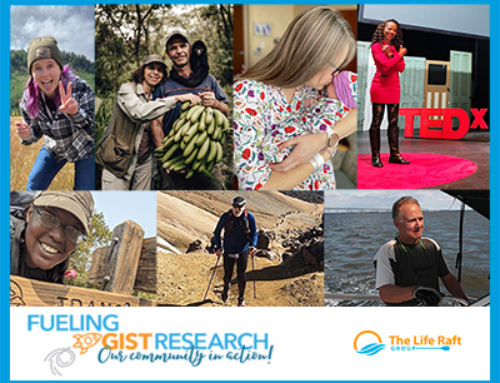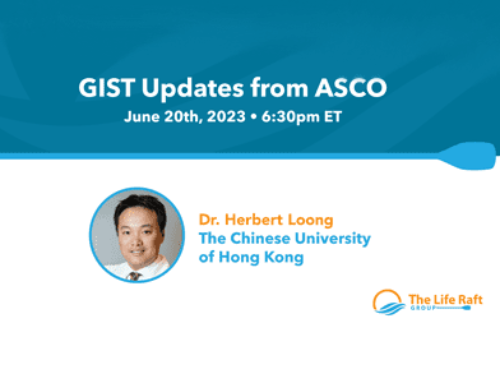
From left to right: Moderator Bogi Eliasen, Copenhagen Institute for Futures Studies. Panel: Julian Isla, Microsoft and Foundation 29; Alexandra Goncalves, Philips Healthcare; Elene Bonfiglioli, Microsoft; Pete Knox; Ernst Kuipers, Erasmus MC University Medical Center, Rebecca Miksad, Flatiron Health
I was honored to represent The Life Raft Group and GIST patients at ISPOR’s 2019 European Conference, held November 2nd-6th in Copenhagen, Denmark. In addition to the standard meetings and poster sessions, I was asked to participate in two speaking sessions – the plenary session that opened the conference, and a smaller more focused session that gave details about the activities of ISPOR’s Real World Evidence (RWE) special interest group, which I and the Life Raft Group are especially proud to be a member of. ISPOR is a global organization that focus on Health Economics Outcomes and Research (HEOR) and how it can be used to improve patient outcomes. Membership comes from the pharmaceutical industry, the research community, vendors that provide data tools and economic models, and also patient advocates.
As valuing the patient perspective is quite in line with the LRG’s mission, I did not hesitate to accept when asked to speak at the conference. The plenary session was attended by between three and four thousand people and was also recorded for archiving on ISPOR’s website in the near future. I participated in a panel that also included representatives from the Copenhagen Institute for Futures Studies, Microsoft, Phillips Healthcare, a patient advocacy foundation from Madrid, Spain called Foundation 29, Erasmus University, Netherlands, and Flatiron Health. Throughout the panel I was able to articulate the importance of combining real world evidence (RWE) with data from clinical trials and electronic medical records (EMRs). The Life Raft Group has been involved in the collection and analysis of RWE for many years, and both my fellow panelists and the audience members I spoke to afterwards seemed rather impressed with our approach to data.
“Patients and caregivers are our highest priority, much of the data that go into outcomes research and health economic analyses start at the patient level. Obtaining feedback, buy-in, and participation by patients or their representatives is imperative to the evidence-based process of defining and determining value at the core of health economics and outcomes research (HEOR). The Society seeks to create an environment where patients’ expertise and knowledge are valued and incorporated for better research and ultimately better health outcomes. To achieve this goal, ISPOR includes patients in scientific discussions within the Society and facilitates the development of the “science of patient engagement” in healthcare research and decision making. ISPOR is the first research-focused organization to establish formal patient engagement groups in all major geographic regions.”
-Lucina Orsini, ISPOR’s Associate Chief Science Officer
I was also able to advocate for including the patient perspective in the data collection process: asking questions that are of importance to patients, recognizing that patients are not only providers of data but also educated consumers that want to understand what their data can tell them about potential treatments and quality of life, and see that their data makes a difference in the lives of other patients, and also finding ways to value their data in ways that motivates them to continue contributing it.
In addition to the plenary session, I was able to speak with various researchers about the RWE special interest group, all of whom agreed that RWE and inclusion of the patient perspective are of paramount importance.
 What I found especially interesting was that so many people came up to me after my speaking sessions (both immediately afterwards and over the next few days) to tell me that it was good to hear the patient perspective, and that previous to my comments they hadn’t really stopped to think of how important it was. While I found it personally gratifying that I had made an impact, it also showed me that we still have work to do if we are to deliver the message that the patient voice needs to be heard. We will continue to do that going forward, as it drives everything we do. Thank you to ISPOR for allowing me to deliver that message and thank you to all of our patients for continuing to provide not only their data, but also for being the reason why we continue fighting to be heard.
What I found especially interesting was that so many people came up to me after my speaking sessions (both immediately afterwards and over the next few days) to tell me that it was good to hear the patient perspective, and that previous to my comments they hadn’t really stopped to think of how important it was. While I found it personally gratifying that I had made an impact, it also showed me that we still have work to do if we are to deliver the message that the patient voice needs to be heard. We will continue to do that going forward, as it drives everything we do. Thank you to ISPOR for allowing me to deliver that message and thank you to all of our patients for continuing to provide not only their data, but also for being the reason why we continue fighting to be heard.
For more information on ISPOR visit: https://www.ispor.org/



